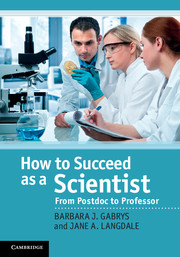Book contents
- Frontmatter
- Contents
- Preface
- Acknowledgements
- Part I Becoming an independent researcher
- 1 Managing your time
- 2 Giving a good research talk
- 3 Writing a quality research paper
- 4 Handling scientific criticism
- 5 Writing grant applications
- 6 Tools for managing research projects
- 7 Is there life beyond academia?
- 8 Applying for a job in academia
- 9 Applying for an independent research fellowship
- Part II Thriving in your new job
- Part III Managing your career
- Index
8 - Applying for a job in academia
from Part I - Becoming an independent researcher
Published online by Cambridge University Press: 05 November 2011
- Frontmatter
- Contents
- Preface
- Acknowledgements
- Part I Becoming an independent researcher
- 1 Managing your time
- 2 Giving a good research talk
- 3 Writing a quality research paper
- 4 Handling scientific criticism
- 5 Writing grant applications
- 6 Tools for managing research projects
- 7 Is there life beyond academia?
- 8 Applying for a job in academia
- 9 Applying for an independent research fellowship
- Part II Thriving in your new job
- Part III Managing your career
- Index
Summary
It is often said that a candidate is assessed by an interview panel within a minute of entering the room – but you have to get to the room in the first place to even be considered for the job. This chapter looks at the process of applying for a job in academia and provides general guidance on all stages of the procedure – from writing an application through to preparation before the interview. The chapter ends with tips for demonstrating your excellence at interview.
The theory
In what follows we assume that you are looking for your first permanent or tenure-track academic post. In the UK this would be Lecturer, in the US Assistant Professor. There are two ways of getting such a post: either by internal promotion or by applying for an advertised post. As the latter case is more typical, we focus on it here.
As there are not many academic jobs available at any given time, the competition for them is fierce – as many as 100 people can apply for each post. Therefore, you will probably need to write several application letters before you get invited for an interview and you may only get a job offer after several interviews. In order to increase your chances of success you need to search widely, do a lot of preparation and planning and hone your interview skills. Interviewing is a communication process centred on talking and listening. It is different from a conversation as an interview is structured. Traditionally, it is conducted face-to-face, but nowadays people can be interviewed by telephone or via a video-link. While statements of factual knowledge and information on a candidate’s attitudes and beliefs can be gathered in all three types of interview, a telephone interview misses non-verbal messages. In this sense both you and the interview panel lose important information.
Information
- Type
- Chapter
- Information
- How to Succeed as a ScientistFrom Postdoc to Professor, pp. 81 - 92Publisher: Cambridge University PressPrint publication year: 2011
